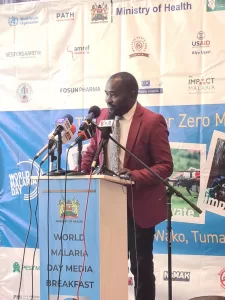
Arnold Ageta
Malaria is a significant public health problem in Kenya where more than 70 per cent of the population is at constant risk from malaria, including those most vulnerable to the disease, specifically children and pregnant women.
Every year, hundreds of thousands of people, mostly children living in Africa, succumb to malaria, an age-old mosquito-borne scourge.
According to the latest World Malaria Report, published in December 2022, by the World Health Organization, malaria claimed lives of an estimated 619,000 people in 2021, compared to 625,000 in 2020. While 247 million new cases of malaria were recorded in 2021 compared to 245 million cases in 2020.
The report further indicates that the African continent continues to shoulder the heaviest burden of the disease since an estimated 95 percent (234 million people) of reported new malaria infections and 96 percent (593,000) of all deaths in 2021 were from Africa whereby 80 percent of these deaths comprised of children under the age of 5.
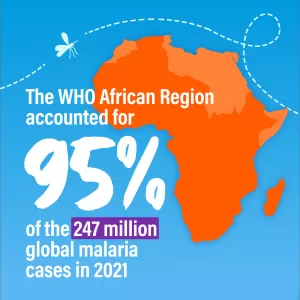
In Kenya, malaria risk is heterogeneous, and its epidemiology is influenced by altitude, rainfall patterns, and temperature. Therefore, malaria prevalence varies considerably by season and across geographic regions.
Nyamira County has made significant efforts in the fight against malaria leading to the decline of malaria cases in the county.
The county boasts as one of the best counties in Kenya that has seen significant decrease of malaria cases in the country and leads in the community malaria case management approach in dealing with the scourge.
According to Hillary Onsongo, Malaria Coordinator, Nyamira County, Malaria now stands at number nine amongst the top ten diseases in the county.
‘‘Previously it used to be in number three but because of the interventions we have put in place, it has been pushed to number nine,’’ he confirmed.
He further says that in 2018 they had 23 malaria cases per a population of 1000 people but it increased briefly to 31 per a population of 1000 people in 2022.
‘‘This increment was experienced in three sub counties namely Nyamira North, Nyamira South and Manga,’’ Mr. Onsongo said.
Malaria cases in Masaba and Borabu sub counties have slightly gone down with a positivity rate of one per cent.
Mr. Onsongo warned that children under the age of five years and pregnant women are at a higher risk of malaria as compared to others. This, he said, was due to their decreased immunity.
Mitigation Measures
Some of the interventions that the county is laying to reduce malaria cases is vector control. This involves the use of nets and lava source management.
‘‘Lava source management is when we pour oil to stagnant water to prevent mosquito breeding,’’ he clarified.
Malaria case management has been one of the ways of malaria control in the county.
He said, ‘‘we also use malaria case management to control malaria in the county. This is the process of diagnosis and treatment done at the community and at the medical facilities.’’
The county government has recently launched the community case management which is doing very well through the support of partners.
They have trained 91 units which translates to 910 community health volunteers (CHVs).
These CHVs are able to carry out malaria tests and administer drugs to patients who manifest malaria symptoms. If the patient is not responding, they refer them to the health centres for other advanced tests to be carried out.
Catholic Medical Missions Board (CMMB) which is implementing a malaria project in Nyamira County has been in the forefront of training CHVs to support vulnerable women and children.
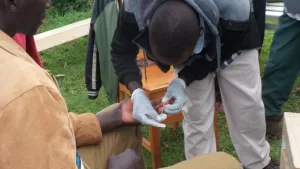
Hillary Ngeso, CMMB Programme Manager in Nyamira County says, they support 910 community health volunteers who are linked to 64 health facilities.
‘‘The hope of what we are doing is that, those who are tested for malaria and are positive can be managed at home,’’ he said.
He added that people who have malaria do not necessarily have to make long journeys to the hospitals, if the case is not complicated.
‘‘These services have been brought to the community and the CHVs have been trained to competently do implement them.’’ said Mr. Ngeso.
CMMB has been doing capacity building to community health volunteers who are trained to offer health services at the community level.
‘‘Once we train them, we equip them to identify people who are suspected to have malaria in the community and test them using malaria rapid test kits,’’ he added.
For those confirmed to have malaria, Mr. Ngeso said, the community health volunteers are able to treat them and monitor the treatment and follow up until they recover.
According to Mr. Onsongo, the implementation of this community case management has tremendously reduced malaria cases in Nyamira County as compared to previous years.
Community case management supports the normal facility case management where malaria patients are treated at the health facilities.
The county has in put in place a successful malaria epidemic preparedness and response programme that is able to respond to malaria outbreaks.
‘‘We carry out malaria surveillance at the facility level with weekly reports of malaria cases. We get malaria data from every facility and community. We monitor to see the trend of malaria and if any case is reported, we act immediately,’’ said Mr. Onsongo.
He says they have acquired anti malaria drugs because it is a rainy season besides training healthcare workers and doing social mobilization.
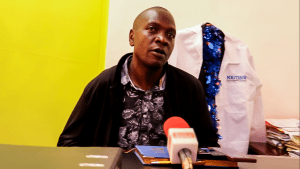
Pregnant mothers
Special treatment has been adopted in the county to control malaria among the pregnant mothers who are at risk of contracting malaria.
‘‘Intermittent Preventive Treatment in pregnancy (IPTp) which is new to our county has been implemented and it involves giving antimalarial drugs (sulfadoxine-pyrimethamine) to pregnant mothers,’’ he explained.
This intervention, he said, started late last year (2022) and priority has been given to Nyamira North, Nyamira South and Manga sub counties where malaria cases are high.
‘‘These interventions have been successful with full support of the county government, Catholic Medical Missions Board (CMMB), Afya Ugavi and the National Malaria Programme,’’ said Mr. Onsongo.
On the other hand, Mr. Ngeso asked pregnant women to visit medical facilities for their antenatal clinics to receive IPTps to boost their immunity against malaria.

Challenges in the fight against malaria
Despite the successes that the county has recently recorded in the fight against malaria, there are underlying challenges that need to be addressed as the country nears 2030 mark of eradicating malaria.
The county is in the process of running malaria behavior change social communication campaign. This involves passing messages to the general public using our community health workers to schools, media campaigns and public barazas.
‘‘These are aimed at enabling the community to change some of the behaviors which thwart the fight against malaria like using mosquito nets to fence their gardens,’’ Mr. Onsongo said.
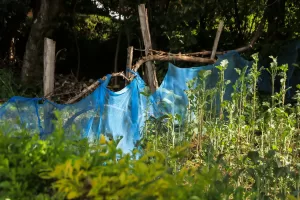
Mr. Ngeso says that some people are not using bed nets due to some cultural and personal reasons.
‘‘Most have the bed nets but they do not want to use them. Some use them to fence their gardens because they think that malaria is contracted by being rained on,’’ he said.
Further, he said, some people who are suspected to have malaria do not want to seek treatment as early as possible.
‘‘Men are the most affected by not seeking medical attention claiming they want to monitor themselves,’’ he added.
Another challenge that was raised by Mr. Ngeso is the environmental issue. He said swampy areas have high cases of malaria especially areas where brick making business is carried out and non-filled open quarries.
‘‘Swampy areas act as breeding spots for mosquitoes. We are working on how we can control cases in those areas,’’ he said.
Related Stories:
Herbalists thrilled with the news of a proposed bill that seeks to recognize their work
Mutata Tipin: Pulling through horrific trauma of FGM in West Pokot
Nyamira lauded for efforts to curb malaria cases
Nyamira Governor launches state of the art accident and emergency ward in Nyamira
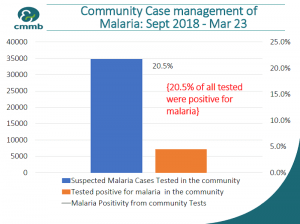
World Malaria Day
As the world marks World Malaria Day in April 25, Nyamira County boasts of reduced cases of malaria through various interventions.
‘‘We have continuous mentorship programmes to our staff, especially the newly recruited staff. In our last mentorship programme, we covered ten facilities in each sub county and trained 253 healthcare workers,’’ Mr. Ngeso said.
The county did mass net distribution to the public which covered around 93 per cent of the total population in the county.
‘‘In our last mass net distribution we covered 93 per cent people and we are planning to do another exercise come next year (2024),’’ he clarified.
‘‘Because of these success stories in our county, we were selected to host ‘World Malaria Day’ national event at Ekerenyo on April 25, 2023,’’ Dr. Timothy Ombati announced in an earlier event.
Dr. Ombati, Chief Executive Committee Member of Health Services in Nyamira County, is enthusiastic about this event and welcomes the country to Nyamira to witness the great work that is being done by the county in the fight against Malaria.
‘‘I invite health stakeholders to benchmark Nyamira County to share some of the strides we have made in the health sector. Through innovation, investment and implementation, I am confident that we shall defeat malaria in Sub-Saharan Africa,’’ he said.
Dr. Ombati was speaking at the World Malaria Day breakfast organized by the MoH in a Nairobi hotel to review the event’s preparedness.
World Malaria Day is an annual global event that brings stakeholders and members of the public together to highlight the strides made in the fight against malaria.
Nyamira county which falls under highland epidemic prone zone witnesses the upsurge of malaria cases during the long rains.
However, the three sub counties (Nyamira North, Nyamira South and Manga) with rising cases of malaria are becoming endemic because we have malaria cases through the year.
According to CMMB’s Hillary Ngeso, data indicates that as county malaria cases are going down.
‘‘The prevalence has reduced not only in the county but the country at large. All these interventions being put in place can bring it down and eventually be eliminated completely,’’ he said.
As per the Kenya Malaria Indicator Survey report that was released in 2020, malaria prevalence rate in Nyamira was 1 per cent up from 3 per cent in the previous years.
The theme for this year’s World Malaria day is ‘invest, innovate, implement, time to deliver zero malaria’.
The Kenyan slogan for this year is ‘tekeleza wajibu wako tumalize malaria.’
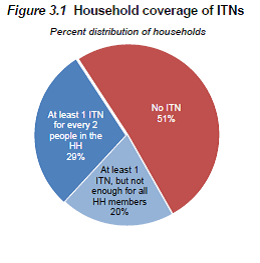
Meanwhile, Mr. Ngeso has advised the national government and stakeholders to support and strengthen interventions that CMMB and the county have put in place to make sure that people can use the right interventions, adopt best practices like consistent use of nets.
Last year (2022), the World Malaria Day national event was held in Kakamega County which is classified as an endemic prone county.
Cabinet Secretary for Health Services in Kenya Dr. Susan Nakhumicha, has said that Malaria continues to be a major public health concern globally, particularly in sub-Saharan Africa.
The Principal Secretary Ministry of Health, State Department for Public Health and Professional Standards, Dr. Josephine Mburu, attended a stakeholders’ meeting to review the progress of preparations for the World Malaria Day 2023.
“As we approach the national event on April 25th, 2023 at Ekerenyo Grounds in Nyamira County, Kenya, we look forward to bringing together stakeholders and the public to highlight progress made in the fight against malaria and to renew our commitment to ending this devastating disease,” she said.
As the world observes malaria day, all eyes are directed to the governments to play their role in funding malaria programmes to completely eradicate the disease.


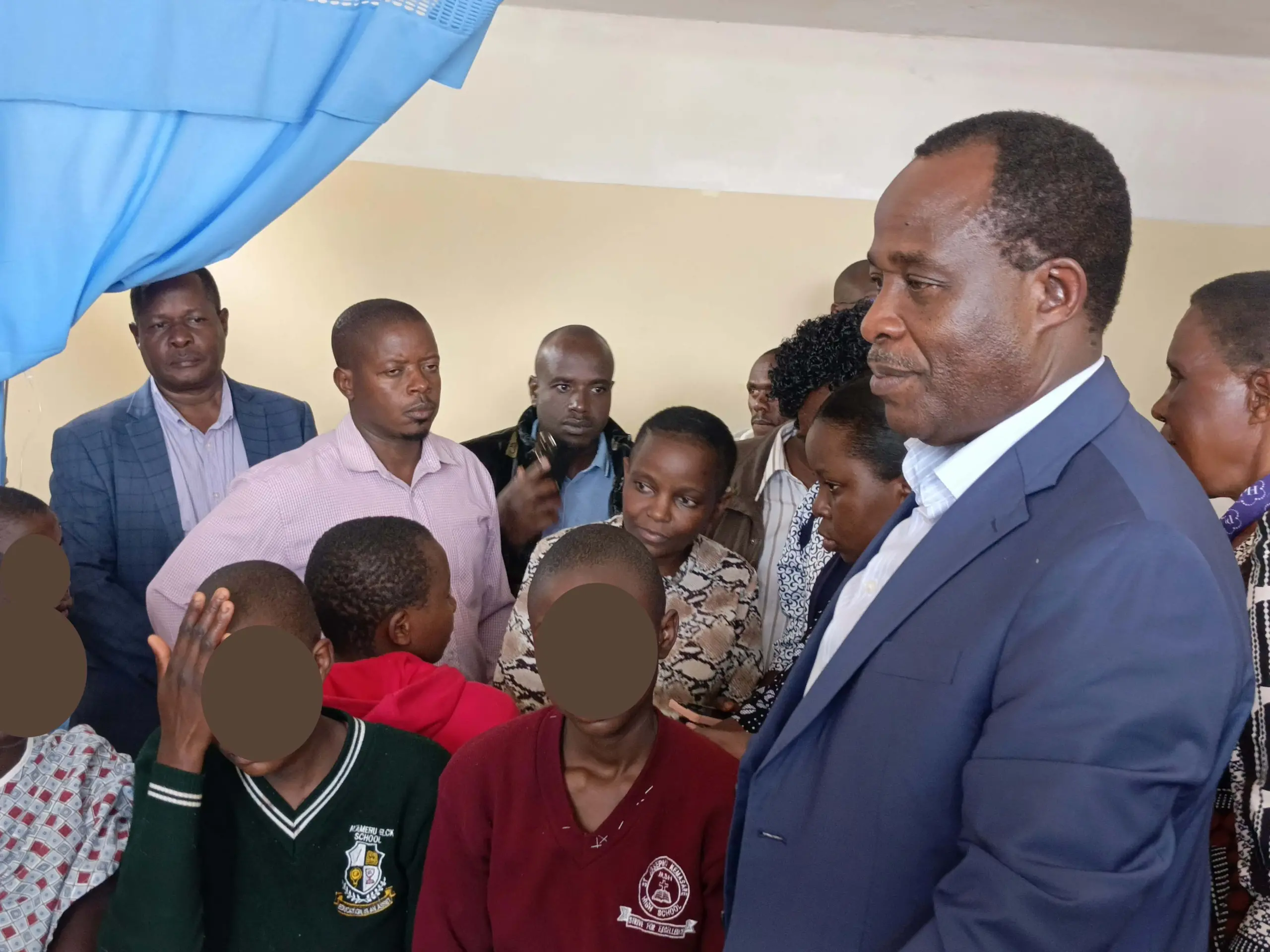

The county is doing well in addressing malaria cases and other illness. Bravo to the leadership, keep up the good work